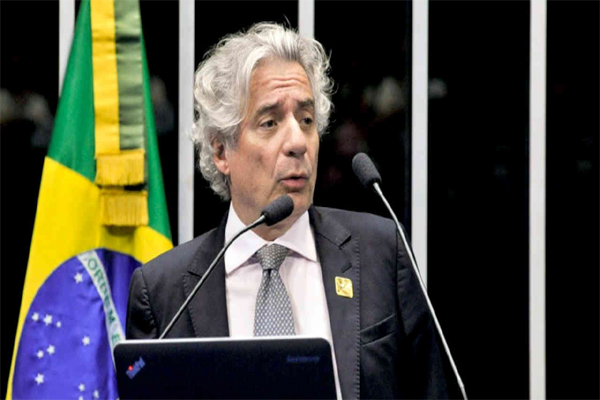
on the good will of his government colleagues (Geraldo Magela/Ag. Senado)
Márcio Juliboni, Money Times
SAO PAULO
EnergiesNet.com 03 29 2022
Upon being confirmed by the Ministry of Mines and Energy as the next president gives Petrobras (PETR3; PETR4), the Economist Adriano Pires will put to the test your formula for contain fuel readjustments.
As one of the leading energy experts do Brasil, with 40 years of experience in the sector and a stint in ANP (Agência Nacional do Petróleo, Gás e Biocombustíveis), Pires has spoken publicly several times in recent weeks about the price increases of Gasoline It’s from diesel.
In an interview with the news channel CNN for example, the economist stated that there was no alternative for Petrobras, other than to promote the strong price increase that took effect on March 11, when Petrobras refineries started charging 25% more for diesel and 18.8% more for gasoline.
“Petrobras could not help but increase, because the price lag it was too big between the domestic and foreign markets,” he told CNN at the time, and added: “The country imports 30% of what is consumed from oil products. If the lag is too big, nobody cares. Worse than the high price is shortages”.
The priority to insure fuels, according to Pires
In an article published in the journal The State of São Paulo on January 22, Pires indicated short-, medium- and long-term measures to prevent fuel from setting fire to Brazilians’ pockets.
In the text, Pires recommends redefining priorities. “It is essential to understand that what we must seek is to reduce the speed of price volatility in the consumer’s pocket, more than cheap gasoline and diesel”, he wrote at the time. In plain English, it’s not about preventing gasoline from increasing, but about making the price fluctuate more smoothly.
To achieve this goal, the expert reminds us of a few points. The first is that “the exchange rate has been a great villain, equal or worse than the oil price.” As an example, he cites that, if the dollar were worth R$ 4.50, the price of gasoline and diesel could drop 14%.
Another is that discussing the reduction of profit margins refineries, distributors and fuel dealers will get us nowhere, as these margins are low all over the world, and this is a characteristic of the oil industry.
Therefore, Pires defended, in the article in the Estadão that “a reduction in volatility and prices in the short term will only be possible by changing the share of taxes”. He stresses that taxes do not cause prices to rise, but contribute to their great volatility, due to the way they affect fuels.
Thus, for the future president of Petrobras, the path to smooth the readjustments of gasoline and diesel passes, in the short term, through a “ICMS reais/liters calculated with terms longer than the current 15 days”. In the medium term, it is necessary to “wait for the appreciation of the real against the dollar”. And, in the long run, “having a stabilization fund or a new tax as a structural policy to reduce volatility.”
Will Pires be able to convince Bolsonaro and Paulo Guedes?
The big knot of this solution is that it focuses on factors that are beyond the control of the next president of Petrobras, and can only be addressed by the political area of the government of Jair Bolsonaro. As is well known, any change in the way the ICMS is levied on fuel goes through the governors, and none of them is willing to give up revenue in times of economic stagnation.

(Adriano Machado/Reuters)
Himself Ministry of Economycaptained by Paulo Guedes, was pointed out as one of the points of resistance to create a mechanism to mitigate price fluctuations. When referring to the proposal to create a stabilization fund, with resources from royalties and dividends of Petrobras, Pires stated, in an article published on January 25 on the Poder 360 website:
“The solution [para reduzir a volatilidade dos preços] should have been presented by the government, the ANP and CADE, but the Ministry of Economy has always been a barrier, alleging the practice of interventionism and subsidies.”
Pires reinforced the importance of the fund, emphasizing that “just zeroing federal taxes on fuel is very little, no more than 10%, given the rally in oil prices that we should have in 2022.”
With so many years of experience in the sector, Pires seems to have the path laid out to prevent bumps in the international oil market from keeping Brazilians awake at night. But part of this prescription would be in charge of government colleagues who he himself has already acknowledged are not, exactly, excited about these ideas.
Finally, it must be remembered that his future boss, President Bolsonaro, hopes that Petrobras will not get in the way of his plans to be reelected in October. Pressure to contain fuel prices will grow as the former captain slips in polls.
If Petrobras were a 100% state-owned company, political interference would only generate complaints from those who defend the freedom of the market. But, as Pires also reminded Poder 360, “It is never too much to remember that Petrobras is not a state-owned company, but a mixed capital company. Therefore, it needs to respect the interests of its private shareholders.” And Bolsonaro has already lamented, loud and clear, this fact.
And as Pires himself warned in the article to Poder 360, “the danger is that at any moment, with pressure from society and political populism, the pendulum will revert to those practices of using Petrobras as an instrument of economic and partisan policy.” .” Will Bolsonaro resist the populist temptation?
moneytimes.com.br 03 28 2022 translation, Global Happenings.com











